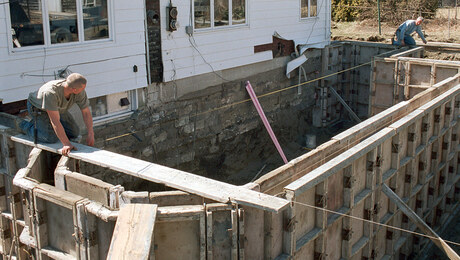Does anyone have any information on putting anti-freeze in forced hot water heat pipes. Any pros or cons?
Thanks,
Mindy
Does anyone have any information on putting anti-freeze in forced hot water heat pipes. Any pros or cons?
Thanks,
Mindy

There are a number of ways to achieve a level foundation and mudsill.

"I have learned so much thanks to the searchable articles on the FHB website. I can confidently say that I expect to be a life-long subscriber." - M.K.
Get home building tips, offers, and expert advice in your inbox
Fine Homebuilding
Get home building tips, offers, and expert advice in your inbox
© 2024 Active Interest Media. All rights reserved.
Get home building tips, offers, and expert advice in your inbox
Become a member and get instant access to thousands of videos, how-tos, tool reviews, and design features.
Start Your Free TrialGet complete site access to expert advice, how-to videos, Code Check, and more, plus the print magazine.
Already a member? Log in
Replies
Glycol is commonly used in hydronic heating (i.e. forced hot water) systems where pipes or coils are potentially subject to freezing temperatures as an antifreeze. This is basically the same stuff that is in your car, but do't put Prestone in your heating system. The use of glycol changes the amount of heat each gallon of fluid can contain at a given temperature, and changes the operation of the system. Coils, radiators, finned-tube convectors and PEX tubes are all sized differently when used with glycol.
So what does that mean in English? It will make the heating system less effective (not less efficient) than if it had 100% water.
Cons: None, really, except maybe cost and hassle, some reduction in system capacity.
Pros: your heating system will not freeze and burst.
Another pro is that such solutions often have corrosion inhibitors in them.
A con would be that ethylene glycol is toxic, especially to pets, and apparently tastes good to them. So if you ever had a leak and a dog, the dog may drink it and be killed. Of course, it's used all over and few people have trouble. Your system should have zero leaks.
Another con is that you can't dispose of it down the drain. It would have to be taken to an automotive shop for disposal as antifreeze.
I use it, but only if it is really, really necessary.
DO NOT use car antifreeze. Use only Propolene Glycol, non-toxic antifreeze designed for heating and solar systems and not the RV stuff you see in the DIY store. Before installing it, replace all the gaskets and air vents, add isolation valves and a backflow preventer. Many times I can get away with 25% solution. If all you want to do is protect the pipes in a ceiling over an unheated but insulated garage, that is enough to keep them from freezing.
Pros: Keeps pipes from freezing.
Cons: Leaks where water doesn't. Gums up zone valves, air vents and flow checks. Leaves a residue in the pipes. Needs to be checked and replaced periodically. Loss of efficiency. In low mass boilers it can cause surging and popping. Makes servicing and modifications more difficult.
Before doing anything, check your local codes, boiler manufacture warranty and installation instructions.
Yesterday I couldn't even spell plumber, today I are one.